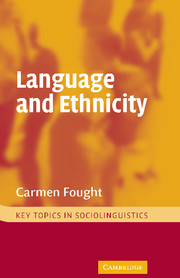Book contents
- Frontmatter
- Contents
- Preface
- Acknowledgments
- Part I General issues in ethnicity and language
- Part II Linguistic features and ethnicity in specific groups
- 3 African-American groups
- 4 Latino groups
- 5 Linguistic variation in other multiethnic settings
- 6 Are white people ethnic? Whiteness, dominance, and ethnicity
- 7 Dialect contact, ethnicity, and language change
- Part III The role of language use in ethnicity
- Notes
- Glossary of terms
- References
- Index
- References
5 - Linguistic variation in other multiethnic settings
Published online by Cambridge University Press: 05 September 2012
- Frontmatter
- Contents
- Preface
- Acknowledgments
- Part I General issues in ethnicity and language
- Part II Linguistic features and ethnicity in specific groups
- 3 African-American groups
- 4 Latino groups
- 5 Linguistic variation in other multiethnic settings
- 6 Are white people ethnic? Whiteness, dominance, and ethnicity
- 7 Dialect contact, ethnicity, and language change
- Part III The role of language use in ethnicity
- Notes
- Glossary of terms
- References
- Index
- References
Summary
Some Cajuns are ashamed of their nonstandard English, but most are not … Male college students have told me that they consciously exaggerate their accents when vacationing at resorts outside of Acadiana, in order to attract the attention of non-Cajun women, who are allegedly fascinated by the Cajuns' unconventional style of speech.
(Gutierrez, cited in Walton 2004:107)In any community that encompasses people of multiple ethnic backgrounds, we might expect to find interesting sociolinguistic variation related to ethnicity. In a majority of countries where research related to language and ethnicity has been done, though, the focus has been on bilingualism and language choice issues as part of ethnic or national identities. Studies that look at variation within a language, on the other hand, can provide a different sort of window into the construction of ethnic identity. Not everyone in a community may have access to the heritage language associated with it, so that bilingualism versus monolingualism might not ever come up as a choice for some speakers of a particular ethnicity. On the other hand, most or all of the speakers in a community may have some access to the dominant language, so that variation within or across dialects is more available as a signal of ethnicity. This chapter brings together sociolinguistic research from several multiethnic areas around the world, focusing on variation (particularly dialect variation) related to ethnicity. The role of heritage languages will also be touched on, particularly where it plays a key role in ethnic identity.
- Type
- Chapter
- Information
- Language and Ethnicity , pp. 89 - 111Publisher: Cambridge University PressPrint publication year: 2006



